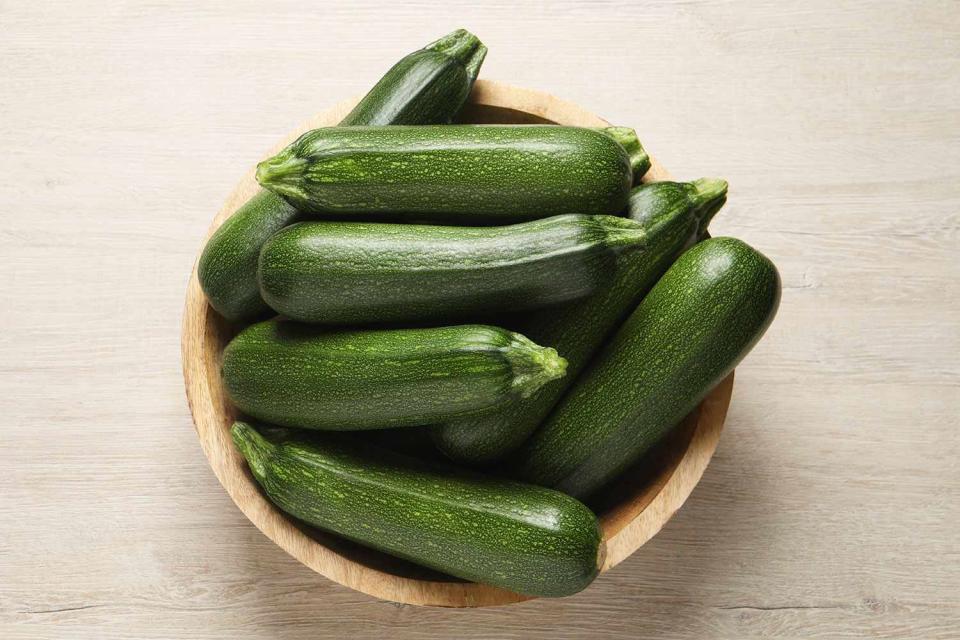How to Store Zucchini the Right Way, According to Food Scientists and Chefs
Follow our expert tips to keep this favorite summer squash fresh.

Liudmila Chernetska / Getty Images
Summer is prime time for zucchini, a type of squash known for its high water content and mild, grassy flavor. But unlike its winter counterparts (such as butternut squash and pumpkin), zucchini has a thinner skin, making it more perishable. To get the most out of your summer squash, it's worth learning how to properly store zucchini, whether whole, cut, or cooked. Learn the best practices according to a food scientist, food safety expert, chef, and cooking teacher, plus tips for extending the shelf life of this popular vegetable.
Related: Zucchini and Cucumbers Are More Alike Than You'd Expect, Here's How
How to Store Whole Zucchini
Whole, uncut zucchini should be stored in a loosely closed plastic bag in the crisper drawer of the refrigerator. The plastic bag will keep the zucchini fresh by preventing moisture loss, according to Albert Nguyen, chef-instructor at the Institute of Culinary Education in New York City. Meanwhile, the crisper drawer will stop excess moisture from accumulating on the zucchini, which would otherwise promote spoilage, says Bryan Quoc Le, Ph.D., food scientist, food consultant, and author of 150 Food Science Questions Answered.
Shelf Life
When stored properly, whole zucchini will last for one to two weeks in the refrigerator, according to Nguyen.
How to Store Cut Zucchini
If you've already cut raw zucchini, follow these steps to keep it fresh, as provided by Nguyen:
Line a plastic container with a dry paper towel. This will help absorb excess moisture.
Place the cut zucchini in the container. Secure the lid.
Store the container in the crisper drawer of the refrigerator.
Shelf Life
Cut zucchini will last four to five days when stored correctly.
How to Store Cooked Zucchini
This is the best way to store cooked zucchini, according to Nguyen:
Let the cooked zucchini cool completely.
Place the cooked zucchini in a container made of plastic or glass. Secure the lid, making sure it's airtight.
Transfer the container to the refrigerator.
Shelf Life
As with all cooked foods, leftover cooked zucchini will last three to four days in the refrigerator, per the USDA.
Can You Freeze Zucchini?
Raw zucchini is delightfully crunchy, while cooked zucchini (when prepared correctly) has a slightly spongy interior and mildly crunchy exterior. Freezing the vegetable will cause ice to form inside its cells, ultimately expanding the plant tissue and making it soft, says Le. Therefore, if the texture of zucchini is a priority in your dish, you'll want to avoid freezing it.
The exception is if you want to use zucchini in recipes where the texture isn't important, such as soups, stews, or purees, says Nathan Lyon, chef, cookbook author, and host of A Lyon in the Kitchen on Discovery Health. To freeze zucchini for these applications, follow these steps from Lyon:
Prepare an ice-water bath in a bowl. Line a baking sheet with parchment paper.
Cut fresh zucchini into cubes or slices.
Bring a pot of water to a boil.
Add the zucchini and blanch for 3 minutes.
Using a slotted spoon, transfer the zucchini to the ice water bath.
Remove the zucchini with the slotted spoon and place it on the baking sheet in a single layer.
Gently pat the zucchini dry with a paper towel. Transfer the baking sheet to the freezer for 1 or 2 hours.
Once the zucchini pieces are frozen, transfer them to a freezer-safe silicone or plastic bag, removing as much air as possible.
Place the bag in the freezer.
Shelf Life
For the best quality, use frozen zucchini within three to four months, says Le.
Related: The Right Way to Store Celery So It Stays Fresh and Crisp
How to Make Zucchini Last Longer
Our experts share three ways to keep zucchini fresh for more time:
Buy Fresh Zucchini: For the longest shelf life, buy the freshest zucchini you can find. Look for ones that are firm and shiny, says Nguyen. "This lets you know that the vegetable is still fresh and not drying out or rotting," he adds. The zucchini should also have a bright green color.
Avoid Washing Before Storing: Always store zucchini unwashed. This is key because any moisture present on the zucchini's surface during storage will promote the growth of mold and other spoilage microorganisms, says Kimberly Baker, Ph.D., RD, LD, director of the Clemson Extension Food Systems and Safety Program Team. "This happens because the additional moisture creates the perfect environment for these microorganisms to grow," she adds.
Store Away From Ethylene-Releasing Produce
Ethylene is a gas that's released by certain fruits and vegetables. It's part of the respiratory cycle of plants and naturally accelerates ripening, according to Baker. Some vegetables—such as zucchini—are ethylene-sensitive, meaning they'll spoil and decay more quickly when exposed to the gas. "Therefore, zucchini should be stored away from [fruits and vegetables] that produce ethylene, such as green onions, potatoes, and tomatoes," says Baker.
Signs of Spoiled Zucchini
If your zucchini has brown spots, bruising, soft spots, or mushiness, it's likely past its prime and ready for the compost bin, says Lyon. Likewise, zucchini with pitting or mold should be tossed, says Le.
Note that zucchini with shriveled skin isn't necessarily spoiled, and it might still be safe to eat, says Baker. Shriveling simply means the zucchini is dry, so it might have a chewier texture when roasted or sautéed, says Nguyen. In this case, you can add a splash of liquid (such as a tasty marinade) when cooking the zucchini, he says.
Read the original article on Martha Stewart.

